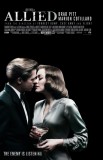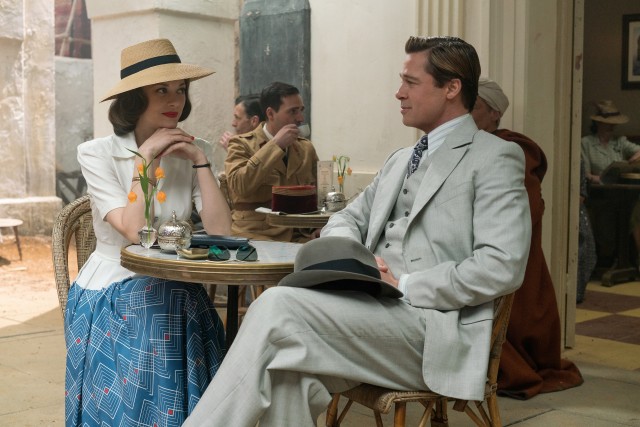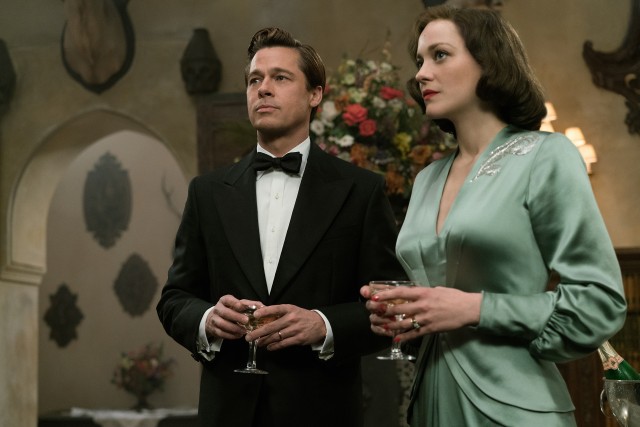Allied Movie Review

Allied is now available on home video. Read our review of the 4K Ultra HD + Blu-ray + Digital HD combo.
 |
Allied
Theatrical Release: November 23, 2016 / Running Time: 124 Minutes / Rating: R Director: Robert Zemeckis / Writer: Steven Knight Cast: Brad Pitt (Max Vatan), Marion Cotillard (Marianne Beausιjour), Jared Harris (Frank Heslop), Simon McBurney (S.O.E. Official), Lizzy Caplan (Bridget Vatan), Daniel Betts (George Kavanagh), Matthew Goode (Guy Sangster), Camille Cottin (Monique), August Diehl (Hobar), Thierry Frιmont (Paul Delamare) |
Buy Allied from Amazon.com:
4K Ultra HD + Blu-ray + Digital HD Blu-ray + Digital HD DVD Instant Video
There isn't a whole lot that unifies Robert Zemeckis' nearly 40-year The film opens in Morocco in 1942 with Canadian intelligence officer Max Vatan (Brad Pitt) parachuting down in the desert. He is picked up and driven to meet his wife Marianne Beausejour (Marion Cotillard). Obviously, the two are not really married; they haven't even met before. Max is posing as a Parisian phosphate miner, whom Marianne's friends are surprised to learn really exists. They pose as a couple, she helping him with his accent, while plotting to assassinate Germany's ambassador in Casablanca at an exclusive dinner.
While playing married, Max and Marianne really do fall for one another, feelings they first act upon in a car in the middle of a sandstorm. Before leaving, Max invites Marianne to join him back in London, where he is stationed. When she finally receives clearance to do so, they are married and soon after welcome a daughter.
All seems to be well for the family of three, until Max is called in by stealthy superiors and asked to discover if their suspicions are correct and that Marianne is a really a German spy who assumed a Frenchwoman's identity. Max is stunned by even the suggestion of that, but he is obligated to carry out their "blue dye" operation as ordered to test his wife's allegiances.
With that twist, the original screenplay by the UK's Steven Knight (Eastern Promises, Locke, Dirty Pretty Things) assumes a Hitchcockian tone. Zemeckis knows just how to present that material, repeatedly managing to generate suspense from Max looking into the seemingly unthinkable and hoping it's one big mistake.
Zemeckis is actually comfortable with all of the film, even if it's clearly not in his not so easily defined wheelhouse. The period European production design is terrific, as is the cinematography by Don Burgess, who has worked on a number of past Zemeckis films. The visual effects aren't designed to grab your attention or drop your jaw, but a crashing aircraft, But Allied is more striking for its human drama than for its technical achievements. Knight's story is the star and it's one that draws characteristically good performances from Pitt, Cotillard, and the peripheral support, from third-billed Jared Harris in a few good scenes to Simon McBurney and Matthew Goode, who each impress in single scenes. You're moved by the compelling story and characters first and foremost, while all the cinematic achievement sneaks past your notice, welcoming appreciation only later.
Opening on Thanksgiving Eve, Allied seems like an awards movie on paper. Is it an awards movie in execution? Perhaps. It doesn't have the sizzle or buzz of the season's rawer dramas like Moonlight and Manchester by the Sea. But it does fit a conventional awards mold, inviting comparison to films like Atonement and The English Patient. With the exception of Forrest Gump, Zemeckis' films have mostly settled for technical recognition and only the infrequent acting nod. Allied probably won't buck tradition, but it should command enough respect from critics to justify its release during Hollywood's intelligent, serious movie season.
Buy Allied from Amazon.com:
|
Related Reviews:
DVDizzy.com | DVD and Blu-ray Reviews | New and Upcoming DVD & Blu-ray Schedule | Upcoming Cover Art | Search This Site
DVDizzy.com Top Stories:
Now in Theaters: Manchester by the Sea Nocturnal Animals Rules Don't Apply Moonlight Arrival Moana Fantastic Beasts and Where to Find Them
Directed by Robert Zemeckis: The Walk Flight Forrest Gump Used Cars A Christmas Carol Who Framed Roger Rabbit Beowulf
Brad Pitt: Fury The Curious Case of Benjamin Button Killing Them Softly The Big Short World War Z
Marion Cotillard: Rust and Bone The Immigrant Two Days, One Night The Dark Knight Rises Nine Contagion Midnight in Paris
Written by Steven Knight: Dirty Pretty Things Eastern Promises Burnt The Hundred-Foot Journey Pawn Sacrifice
The Light Between Oceans The Imitation Game
Text copyright 2016 DVDizzy.com. Images copyright 2016 Paramount Pictures and GK Films.
Unauthorized reproduction prohibited.


